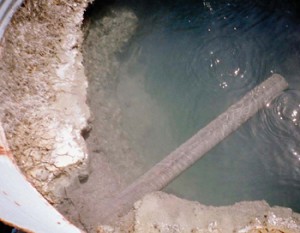Researchers from the University of California Berkeley and the University of Maryland School of Medicine have discovered a microbe in a Nevada hot spring that enjoys eating cellulose (aka plant material) at temperatures above the boiling point of water, 109 degrees Celsius or 228 degrees Fahrenheit. This microbe could hold a key in developing technologies to improve the breakdown of cellulose, an important step in turning biomass to biofuels. The research is being published today in the online journal, Nature Communications.
The hyperthermophilic microbe was discovered in a geothermal pool and is only the second member of the ancient group Archaea known to grow by digesting cellulose above 80℃. In addition, the microbe is the most heat tolerant enzyme found an any cellulose-digesting microbe including bacteria.
 “These are the most thermophilic Archaea discovered that will grow on cellulose and the most thermophilic cellulase in any organism,” said coauthor Douglas S. Clark, UC Berkeley professor of chemical and biomolecular engineering. “We were surprised to find this bug in our first sample.”
“These are the most thermophilic Archaea discovered that will grow on cellulose and the most thermophilic cellulase in any organism,” said coauthor Douglas S. Clark, UC Berkeley professor of chemical and biomolecular engineering. “We were surprised to find this bug in our first sample.”
Robb and his colleagues collected sediment and water samples from the 95℃ (203℉) Great Boiling Springs near the town of Gerlach in northern Nevada and grew microbes on pulverized Miscanthus gigas, a common biofuel feedstock, to isolate those that could grow with plant fiber as their only source of carbon.
The discovery is part of research being led by Clark and his team at UC Berkeley along with a team led by Frank T. Robb U-MD School of Medicine in Baltimore. Their goal was to analyze microbes from hot springs and other extreme environments in search of enzymes that could be used in industrial processes including biofuels.
Today, many of the enzymes used are not optimized for extreme temperatures. For example, according to Clark, a fungal enzyme is used to break down difficult plant cellulose into its constituent sugars to enable them to be fermented by yeast into alcohol. However, the preferred temperature is around 50℃ (122℉), and the enzyme is not stable at higher temperatures desirable to prevent other microbes from contaminating the reaction.
“Our hope is that this example and examples from other organisms found in extreme environments – such as high-temperature, highly alkaline or acidic, or high salt environments – can provide cellulases that will show improved function under conditions typically found in industrial applications, including the production of biofuels,” said Clark who noted that this discovery was interesting because it indicates that there are a lot of potentially useful microbes in places that haven’t yet been looked at.
The research is supported by a grant from the Energy Biosciences Institute.

